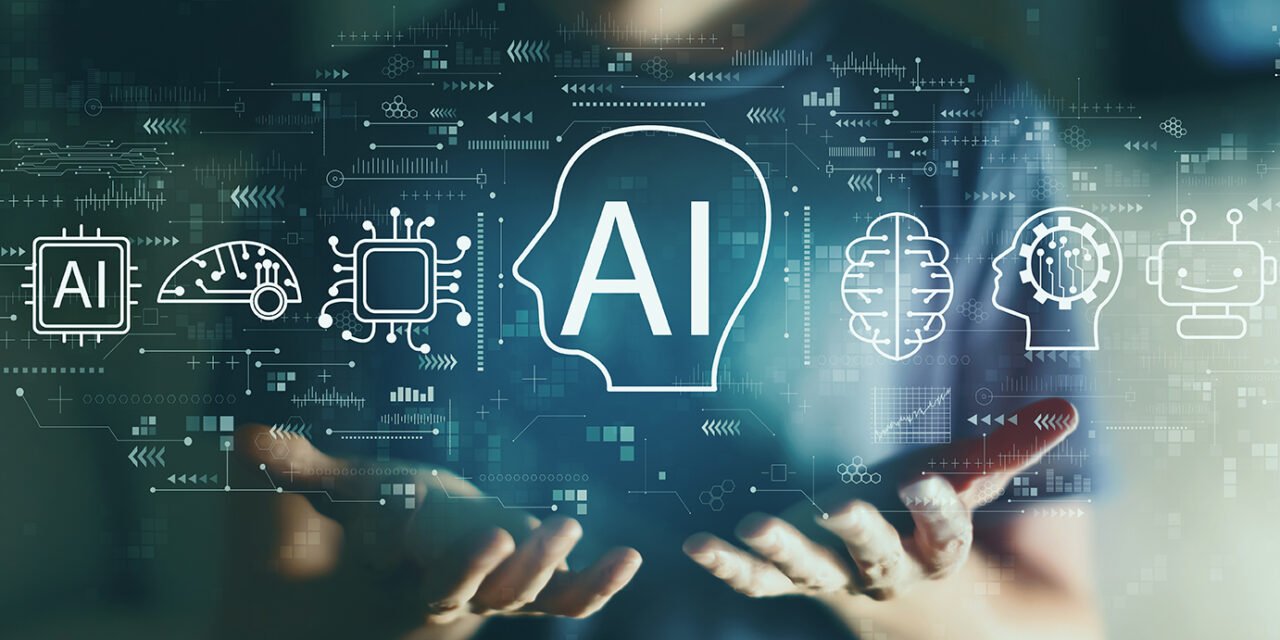AI, the latest wave in tech, also known as artificial intelligence. Similarly to the smart phones we use today, it is transforming our everyday lives and various industries. Undeniably, it also encompasses a wide range of technologies that enable machines to simulate human intelligence and perform tasks that typically require human intelligence. These tasks include learning, problem-solving, and decision-making. AI is revolutionizing sectors like healthcare, finance, transportation, and entertainment. In this post, we will explore what AI is, its key components, and why it is essential for technophiles and ordinary individuals to understand and engage with this transformative wave of technology.
Defining AI
Artificial Intelligence refers to the ability of machines to exhibit human-like intelligence and behavior. Further, it involves the development of computer systems capable of performing tasks that would typically require human interactions. AI systems use a combination of machine learning, natural language processing, and data analytics to process and understand vast amounts of information. It also recognizes patterns and can resolve decisions. These systems can continuously learn from new data and improve their performance in time.
Components of AI
AI comprises several key components that enable its functionalities. These components enable machines to learn, understand and interact in ways that were previously impossible.
1. Machine Learning (ML)
Machine learning (ML) is a subset of AI that teaches machines how to learn from data and make predictions or take actions without being explicitly programmed. ML algorithms analyze and identify patterns in data to make accurate predictions or decisions. As more data becomes available, the algorithms can also refine their models and improve their accuracy.
2. Natural Language Processing (NLP)
NLP enables machines to understand, interpret, and respond to human language. Consider that it involves the processing and analyzing of text and speech. This allows devices to understand context, sentiment, and intent. NLP core feature is to power applications like voice assistants, language translation, and sentiment analysis.
3. Computer Vision
Computer vision enables machines to perceive and understand visual information from images or videos. It also involves tasks like image recognition, object detection, and facial recognition. Computer vision enables the functionality of applications in fields like autonomous vehicles, surveillance systems, and medical imaging.
4. Robotics
Robotics combines AI with mechanical engineering to develop intelligent machines. These machines can perform physical tasks independently or collaboratively with humans. In fact, manufacturing, healthcare, and logistic industries use robots equip with AI capabilities to automate repetitive tasks. This enhances productivity and improves safety.
Why You Should Care about AI

I. Impact on Our Daily Lives
Overall, Artificial Intelligence (AI) has become integral to our daily lives, revolutionizing how we interact with technology. This includes deciding and performing various tasks, from voice assistants like Siri and Alexa, to personalized recommendations on streaming platforms. It has made tasks more efficient, simplified communication that enrich entertainment experiences. Understanding AI helps individuals make the most of these technological advancements.
Enhanced Communication and Interaction
AI-powered voice assistants have enhanced communication and interaction with technology. For instance, instances such as asking for weather updates, setting reminders, or controlling smart home devices. In fact, these capabilities have become virtual companions, making our lives easier and more efficient. These intelligent assistants use natural language processing (NLP) algorithms to understand and respond to human speech, providing personalized information and performing tasks on our behalf.
Efficient Task Automation
One of the significant impacts of AI on our daily lives is the automation of various tasks. Some of which include freeing up time and resources. AI technologies, such as machine learning algorithms, can analyze vast amounts of data and perform complex tasks that would typically require human intervention. For example, AI-powered email filters automatically categorize and prioritize emails. This reduces the time spent on managing overflowing inboxes. Similarly, AI-driven chatbots provide instant customer support, efficiently answering queries and resolving issues.
Personalized Recommendations
AI algorithms have transformed the way we discover and consume content. Streaming platforms, online retailers, and social media platforms leverage AI to meet their needs. They use AI to analyze user preferences, behavior, and past interactions to gather personalized recommendations. For instance, streaming services like Netflix use AI algorithms to suggest movies and TV shows. Spotify uses it to recommend songs based on our listening history. This level of personalization enhances our entertainment experiences and helps us discover new content tailored to our tastes.
Improved Healthcare
AI has significantly impacted the healthcare industry, improving diagnostics, treatment plans, and patient care. AI algorithms can also analyze vast amounts of medical data, including patient records, research papers, and clinical trials. The data is used to assist healthcare professionals in making accurate diagnosis and treatment decisions. For example, AI-powered imaging systems can detect abnormalities in medical images, aiding in the early detection of diseases such as cancer. Equally, AI chatbots can also provide preliminary medical advice, alleviating the burden on healthcare systems.
Enhanced Productivity and Efficiency
AI technologies have enhanced productivity and efficiency in various domains. These intelligent powered tools and software automate repetitive tasks. These tasks also include those used in the workplace, allowing employees to focus on strategic and creative work. AI-driven project management tools can analyze data and provide insights into project. Insight includes timelines, resource allocation, and potential risks. AI-powered virtual assistants can schedule meetings, manage calendars, and streamline administrative tasks.
Transportation and Mobility
AI is transforming the transportation and mobility sector, making travel safer, more efficient, and more convenient. Leading companies are developing and testing autonomous vehicles powered by AI and computer vision technologies. These vehicles might reduce accidents, optimize traffic flow, and increase transportation accessibility. Ride-sharing platforms use AI algorithms to match riders with drivers efficiently, minimizing wait times and improving overall user experience.
Related: How AI Will Change Our Lives
II. Employment and Economic Considerations:
AI has the potential to reshape the job market. However, individuals need to gain AI-related skills and stay updated to remain competitive in the job market. Further, AI can lead to economic growth and innovation, contributing to societal progress.
Related: The Economics Of Artificial Intelligence.
III. Healthcare Advancements
AI has immense potential in healthcare, from disease detection to personalized treatment plans. It can analyze medical data, assist in diagnoses, and even predict health risks. Being aware of AI’s capabilities can empower individuals to make informed decisions about their health and leverage the latest advancements.
IV. Environmental Impact
AI can contribute to sustainability by optimizing energy consumption, reducing waste, and enabling smart resource management. AI-driven solutions like energy grids, transportation, and agriculture can help mitigate environmental challenges. Optimizing the use of AI means supporting and adopting technologies that have positive environmental impacts.
V. Ethical and Social Implications
Artificial Intelligence (AI) holds great promise for improving various aspects of our lives, but also raises important ethical and social considerations. As AI systems become more prevalent and influential, it is crucial to address these implications. This ensures responsible development, deployment, and the use of AI technologies. It is necessary to categorize AI into ethical and social areas to understand the consequences.
1. Bias and Fairness
AI systems learn from historical data, which can contain inherent biases and inequalities. AI algorithms can perpetuate or amplify existing societal biases if these biases are unknown and not mitigated. This can lead to unfair treatment and discrimination in hiring, lending, and criminal justice areas. Developing AI systems that are transparent, accountable, and designed to address and minimize biases is essential.
2. Privacy and Data Protection
AI relies heavily on vast amounts of data, including personal and sensitive information. This data collection, storage, and use increases concerns about privacy and data protection. Safeguards must be in place to ensure that individual privacy rights regarding how data processes and securely handled responsibly. Clear consent mechanisms and robust data protection regulations are crucial to address these concerns.
3. Accountability and Transparency
Accountability and transparency become paramount as AI systems become more autonomous and make decisions that impact individuals’ lives. It is essential to understand how AI systems arrive at their choices, ensure transparency in their algorithms and processes. Establish mechanisms for recourse. It’s important to define logical lines of responsibility and accountability. Individuals can challenge or seek explanations for AI-driven decisions.
4. Job Displacement and Economic Impact
AI has the potential to automate certain tasks, leading to concerns about job displacement and economic inequality. While AI can create new job opportunities, the transition can be challenging for individuals whose jobs are affected. It is important to expect these changes, provide support for re-skilling and up-skilling, and ensure that they share equitably the benefits of AI. This mitigate any potential societal and economic disparities.
5. Safety and Security
AI systems that interact with the physical world, such as autonomous vehicles and robots, raise concerns about safety and security. Ensuring the reliability and robustness of AI systems to prevent accidents or malicious exploitation is crucial. To protect AI systems from unauthorized access or manipulation, security measures should also be in place. To not have these measures can have severe consequences on individuals and society.
6. Human autonomy and control
As AI systems become more sophisticated, there is a need to maintain human autonomy and control. It is important to ensure that humans can understand, challenge, and override AI decisions when necessary. Respecting human values, preferences, and agency should guide the developing and deploying of AI technologies.
Addressing these ethical and social implications requires a multidisciplinary approach involving policymakers, researchers, industry experts, and the public. Collaboration is necessary to establish clear ethical frameworks, regulatory guidelines, and industry standards collaborations are necessary. In addition, prioritizing fairness, transparency, accountability, and the well-being of individuals and society. By proactively addressing these implications, we can harness the benefits of AI. This will help to minimize potential risks and ensure that AI technologies contribute positively to our collective future.
Related: Ethics Of Artificial Intelligence.
Summary
To conclude, artificial intelligence is the latest wave in technology, and its impact on various aspects of our lives is undeniable. Understanding AI and its components is essential for individuals and society at large. AI has the potential to revolutionize industries, create new job opportunities, improve healthcare outcomes, and contribute to environmental sustainability. However, it also poses ethical challenges that require active engagement and thoughtful consideration. By caring about AI, individuals can equip themselves with knowledge and contribute to shaping a future where AI benefits humanity responsibly and inclusively.







